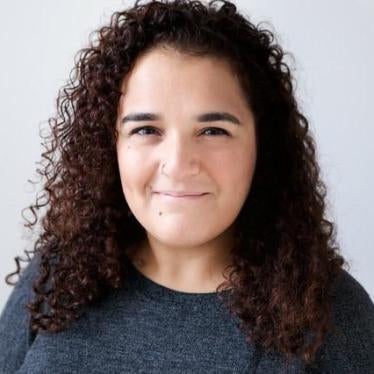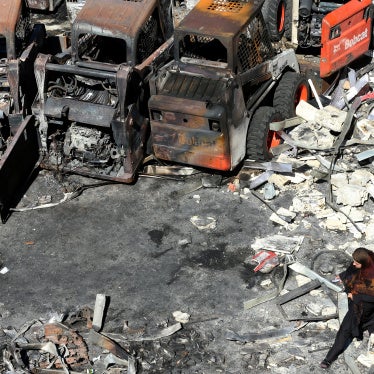The pictures popped up on my phone one after the other last week. The images were of a skeletal young man lying listlessly on a bed partially covered by a blanket, his bony arms dangling over the side of the bed, his ribs protruding from under his bruised skin.
The photos, sent by a doctor, were of Mohamed Shaaban, an 18-year-old resident of the Syrian town of Madaya, who was suffering from severe malnutrition and complications from a gunshot wound on his back. He died on April 4, a victim of the unlawful restrictions on medical evacuations from besieged towns imposed by both government and opposition forces, who are using starving or dying people as bargaining chips.
Shaaban’s uncle told me that the young man was shot in the back six months ago by an unknown sniper while he was collecting firewood. He was given permission to go to Damascus for treatment, but returned in worse shape, continuing to need treatment. The uncle, along with a doctor and an aid worker, told me that Hezbollah, the Lebanese Shiite group allied with the Syrian government that is besieging Madaya, had refused, then allowed, and then postponed a further medical evacuation. Hezbollah refused to let him leave, they said, until civilians in the besieged Shiite town of Fu’a, which is besieged by a rebel group, were permitted to leave.
“He was the oldest of nine kids and the sole breadwinner,” said Shaaban’s uncle, who spoke to Human Rights Watch from inside Madaya. “Now who will take care of his family?”
The plight of people trapped in Madaya gripped the world earlier this year when doctors leaked images of severely malnourished children to the international media. The media attention accelerated a deal between the Syrian government and rebel groups to finally allow aid convoys into towns besieged by one party as long as aid was allowed at the same time to towns besieged by the other. Aid has trickled in since a cessation of hostilities was announced on Feb. 26, but people continue to suffer from malnutrition.
Evacuations of wounded people were supposed to be guaranteed as part of the deal, the Four Towns Agreement, signed in September. But activists and aid workers say that the agreement has not been honored and evacuations have not been consistent.
The U.N. secretary-general reported in March that the U.N. had delivered assistance to 150,000 people in 10 of the 18 besieged areas and to tens of thousands in other hard-to-reach areas in February and early March. Some 486,700 people were under siege as of March, the U.N. said. The independent project Siege Watch puts the number of people living under siege at 1 million.
The secretary-general also said that even in areas where aid was allowed in, the Syrian government has removed life-saving items from convoys. In February alone, convoys with 80,000 medical treatments were not allowed to go on, or equipment was removed from them. The government removed life-saving items such as diarrhea kits, emergency health kits, antibiotics, and other medicines. The U.N. reported that out of 17 requests submitted in 2016 by the World Health Organization to the Syrian government to send medicines and medical supplies to hard-to-reach and besieged locations only two requests had been approved as of March 27. The U.N. was unable to reach an estimated 720,000 people in areas such as Deir al-Zour and Raqqa, which are under siege by forces of the Islamic State.
“The government told us that unless the people from Fu’a were evacuated, Mohamed couldn’t leave,” Shaaban’s uncle said. “We didn’t understand the connection—why link Mohamed to people in Fu’a? It is a mystery to us.”
After weeks of negotiations between an Iranian government representative and representatives of Jaysh al-Fateh, which has laid siege to Fu’a and Kefraya, another town covered under the agreement, an arrangement was made to evacuate Shaaban on April 3, a Sunday. But at the last minute Hezbollah didn’t allow the evacuation to take place on a Sunday, Shaaban’s doctor said, and delayed it to Monday morning. By then it was too late.
Mohamed Shaaban should not have been forced to stay in Madaya. Under international humanitarian law, all parties to an armed conflict are obligated to facilitate rapid and unimpeded humanitarian assistance to all civilians in need and allow civilians to freely leave an area under siege.
Mohamed Darwish, one of three doctors left in Madaya, told me that seven people are in danger of imminent death if they are not evacuated immediately. Another 20 urgently need medical care that they can’t get in Madaya, and another 300 need medical attention. On April 20, 37 medical cases were allowed out of Madaya to receive treatment in hospitals in Damascus and Idlib. Of course, this was too late for Shaaban and it may not be enough for the hundreds more still waiting to be transferred.
The Syrian government needs to stop using sick people as bargaining chips. The same applies to the armed groups besieging Fu’a and Kefraya. The countries pushing the peace process in Syria, including the U.S. and Russia, should use their influence to pressure the government and rebel groups to do the right thing when it comes to saving the lives of people in besieged areas.








